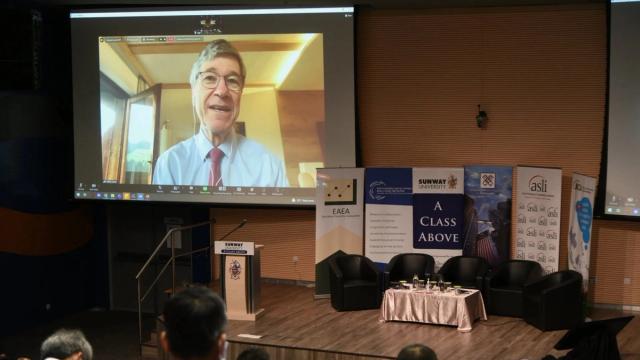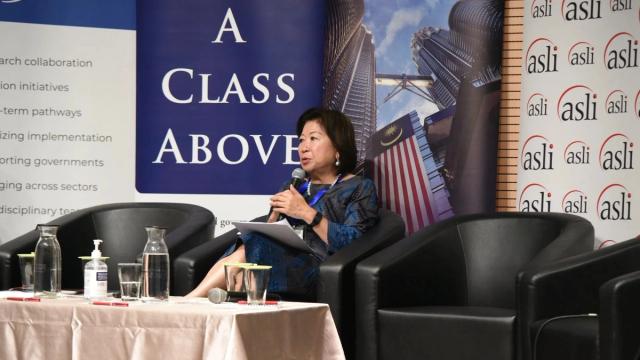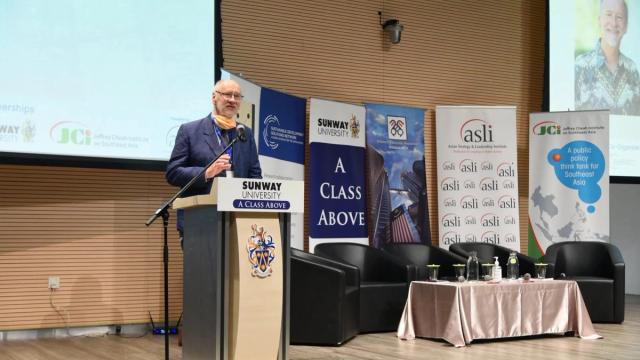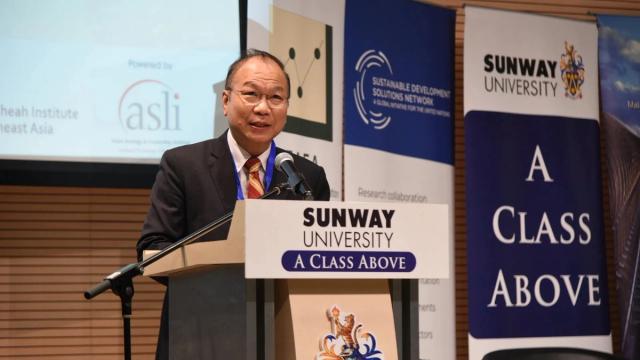SDSN Supports Academic Conference on Growth, Resilience and Sustainability in Asia
The 17th International Convention of the East Asian Economic Association (EAEA) was held on 27-28 August 2022 in Sunway University, Kuala Lumpur, Malaysia in hybrid format.
Over the two days of the academic conference, themed ‘Growth, Resilience and Sustainability: Asian Dynamism in an Uncertain World’, 124 papers were presented with over 100 in-person and virtual participants, including 14 SDSN member institutions from countries such as Australia, Indonesia, Korea, Laos, Malaysia, New Zealand, Singapore and the United States.
Opening Ceremony Speakers:
- Hal Hill, President of EAEA
- Mahendhiran Sanggaran Nair, Pro VIce Chancellor (Research & Engagement & Impact), Sunway University, and Asian Strategy & Leadership Institute (ASLI)
- Woo Wing Thye, Vice President for VP for Asia & Head of Kuala Lumpur Office, SDSN and Chair of Host Organizing Committee
Plenary Session Speakers and Moderators:
- Professor Mari Elka Pangestu, Managing Director of World Bank of Development Policy and Partnership
- Shujiro Urata, Waseda University
- Professor Jeffrey Sachs, President, UN Sustainable Development Solutions Network, Chairman, Jeffrey Sachs Center on Sustainable Development, Sunway University, Honorary Distinguished Professor, Sunway University
- Prof. Fukunari Kimura, Keio University and Chief Economists, ERIA
- Albert Park, Chief Economists, ADB
- Prof. Norma Binti Mansor, MEA President
- Prof. Woo Wing Thye, Vice President for VP for Asia & Head of Kuala Lumpur Office, SDSN
- Mahendhiran Sanggaran Nair, Pro-Vice Chancellor (Research & Engagement & Impact), Sunway University, and Asian Strategy & Leadership Institute (ASLI)
- Tan Sri Dato’ Kamal Salih, University of Malaya
- Evelyn Devadason, MEA and University of Malaya
The first plenary session was titled the Inaugural Distinguished Shinich Ichimura Lecture, named after Professor Shnichi Ichimura, one of the founders of EAEA, the first convention held in Kyoto in 1988. It began with a keynote address by Professor Mari Pangestu , Managing Director of World Bank of Development Policy and Partnership.
In her address, Mari reminded the audience that in the midst of the perfect storm, the need for knowledge has never been higher, critical as developing countries regain the losses made due to the pandemic and get re-focused on sustainable development. Crisis is an opportunity for change, she said, and gave the example of the nexus between conflict and climate change that has given rise to the current global food price and food security crisis, which is relegating millions into poverty. Professor Pangestu shared that climate change will also cost the world 178 trillion US dollars over the next 50 years - almost double global GDP. These development challenges require a coordinated global response and knowledge-based solutions that are fit for the times; albeit the recommendations are timeless : get your policies right, your infrastructure right, your institutions right and your human capital right, in order to attract investment and keep counties engaged in the global value chain.
The discussion that followed, chaired by Professor Shujiro Urata , explored these themes further, particularly how East Asian countries could benefit from clear development pathways towards sustainability.
The second plenary session was themed Global Economic Uncertainties and Sustainable and Inclusive Growth in East Asia. It began with a keynote address by Professor Jeffrey Sachs and was followed by a panel discussion between Professor Fukunari Kimura and Dr Albert Park, chaired by Professor Woo Wing Thye.
Professor Sachs began his keynote discussing the sobering present global economic and geo-political situation which requires global leadership and cooperation. A war, he said, is something that could have been avoided and countries are now crippling themselves with sanctions we do not need. He said these provocations are harmful and do not create a basis for the global solutions and progress that the world needs. Our role, he said, should be problem-solving, not problem-creating. What Professor Sachs proposed instead are: i) a well-educated citizenry and a well-trained labor force to overcome challenges and to master the technological innovation; ii) regional cooperation without which it would be very difficult to address cross-border ecological challenges such as southeast asia's river systems, ocean pollution, loss of species, or transformation of energy systems; and iii) public finance to raise long term revenues to carry out the investments, service debts, and provide public services that are the components of sustainable investment.
In the panel discussion that followed, Dr Albert Park shared ADB data on how risk remains elevated for East Asia, and tilting to the downward. To sustain growth and dynamism, he said that ADB remains focused on regional and global economic integration and being part of global value chains as it not only increases resilience, but it also increases inclusiveness of poor countries, allowing them to get into the global game, create jobs, and invest in digitalization, green transition, and worker skills.
Professor Kimura then delved into geopolitics and global supply chains in ASEAN and East Asia, stressing that, despite geopolitical complications such the US-China trade war, the economic machinery of states should remain under a rules-based trading regime so what countries can utilize their regional trade agreements like AEC or RCEP to reduce policy risks. If a country is imposing some sort of economic statecraft, for instance, they would have to discuss it first within such a framework, and if necessary, utilize the preset dispute settlement mechanisms.
The third plenary session was on Malaysia’s Economic Recovery: Digitization and Green Transition. The first speaker Prof. Norma began her presentation with an overview on Malaysia’s bumpy road to recovery, followed by Malaysia's key economic indicators performance. Next, she highlighted the structural weaknesses hampering Malaysia’s economic progress and the 12th Malaysia Plan game changers. Her presentation concluded on the digitalization and green transition as the way forward.
Prof. Woo ’s presentation was on how to incentivize technological upgrading in Malaysia that is green. He discussed generating dynamic, inclusive, green economic growth for full and productive employment. He discussed graduate salaries and made suggestions on the policy agenda, including ASEAN working with multilateral institutions and taking action on climate through decarbonization. Tan Sri Dato’ Kamal discussed insufficient labor hindering Malaysia’s recovery and Prof. Mahendhiran shared on Malaysia’s economic recovery through digitalization (STI) & green (Planetary Health) transition. Prof. Mahendhiran concluded with the message that if Malaysia does not invest in its STIE Ecosystem and Planetary Health Action Plan, Malaysia will lose its global economic competitiveness.
This event was co-organized by the East Asia Economic Association (EAEA), the Jeffrey Cheah Institute on Southeast Asia (JCI) at Sunway University, and SDSN, in partnership with the Malaysian Economic Association (MEA), Asian Strategy & Leadership Institute (ASLI), and the Jeffrey Sachs Center on Sustainable Development - host institution of SDSN Malaysia. To conclude the days’ event, participants attended networking dinners sponsored by the Economic Research Institute for ASEAN and East Asia (ERIA) and the Asian Development Bank. The next EAEA Convention is scheduled for 2023, in Seoul, Korea.



